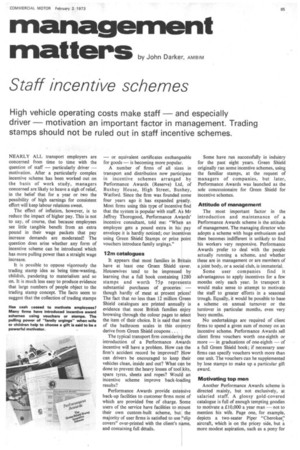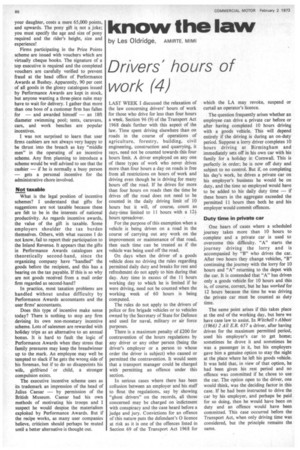management
Page 87

Page 88

If you've noticed an error in this article please click here to report it so we can fix it.
matters by John Darker, AM BIM
Staff incentive schemes
NEARLY ALL transport employers are concerned from time to time with the question of staff — particularly driver — motivation. After a particularly complex incentive scheme has been worked out on the basis of work study, managers concerned are likely to heave a sigh of relief, in the belief that for a year or two the possibility of high earnings for consistent effort will keep labour relations sweet.
The effect of inflation, however, is to reduce the impact of higher pay. This is not to say, of course, that because employees see little tangible benefit from an extra pound in their wage packets that pay increase demands are moderated! The question does arise whether any form of incentive scheme can be introduced which has more pulling power than a straight wage increase.
It is possible to oppose vigorously the trading stamp idea as being time-wasting, childish, pandering to materialism and so on. It is much less easy to produce evidence that large numbers of people object to the trading stamp concept. The facts seem to suggest that the collection of trading stamps — or equivalent certificates exchangeable for goods — is becoming more popular.
A number of firms of all sizes in transport and distribution now participate in incentive schemes arranged by Performance Awards (Reserve) Ltd, of Bushey House, High Street, Bushey, Watford. Since the firm was founded some four years ago it has expanded greatly. Most firms using this type of incentive find that the system is popular with staff. As Mr Jeffrey Thorogood, Performance Awards' incentive consultant, told me: "When an employee gets a pound extra in his pay envelope it is hardly noticed; our incentives using Green Shield Stamps or prize point vouchers introduce family urgings."
12m catalogues It appears that most families in Britain have at least one Green Shield saver. Housewives tend to be impressed by learning that a full book containing 1280 stamps and worth 75p represents substantial purchases of groceries — though hardly of meat at present prices! The fact that no less than 12 million Green Shield catalogues are printed annually is evidence that most British families enjoy browsing through the colour pages to select the item of their choice. It is said that most of the bathroom scales in this country derive from Green Shield coupons...
The typical transport firm considering the introduction of a Performance Awards incentive will have a problem. How can the firm's accident record be improved? How can drivers be encouraged to keep their vehicles clean, inside and out? What can be done to prevent the heavy losses of tool kits, spare tyres, sheets and ropes? Would an incentive scheme improve back-loading results?
Performance Awards provide extensive back-up facilities to customer firms most of which are provided free of charge. Some users of the service have facilities to mount their own custom-built scheme, but the majority of user firms is satisfied to use "slip covers" over-printed with the client's name, and containing full details. Some have run successfully in industry for the past eight years. Green Shield originally ran some incentive schemes, using the familiar stamps, at the request of managers of companies, but later, Performance Awards was launched as the sole concessionaire for Green Shield for incentive schemes.
Attitude of management The most important factor in the introduction and maintenance of a Performance Awards scheme is the attitude of management. The managing director who adopts a scheme with huge enthusiasm and then becomes indifferent is unlikely to find his workers very responsive. Performance Awards prefer to deal with the people actually running a scheme, and whether these are in management or are members of a joint body, or a social club, is immaterial.
Some user companies find it advantageous to apply incentives for a few months only each year. In transport it would make sense to attempt to motivate the staff to greater efforts in a seasonal trough. Equally, it would be possible to base a scheme on annual turnover or the turnover in particular months, even very busy months.
No undertakings are required of client firms to spend a given sum of money on an incentive scheme. Performance Awards sell client firms vouchers worth one-eighth or more — in graduations of one eighth — of a full Green Shield book; if necessary user firms can specify vouchers worth more than one unit. The vouchers can be supplemented by lose stamps to make up a particular gift award.
Motivating top men Another Performance Awards scheme is directed mainly, but not exclusively, at salaried staff. A glossy gold-covered catalogue is full of enough tempting goodies to motivate a £10,000 a year man — not to mention his wife. Page one, for example, depicts a two-seater Piper "Cherokee: aircraft, which is on the pricey side, but a more modest aspiration, such as a pony for your daughter, costs a mere 65,000 points, and upwards. The pony gift is not a joke; you must specify the age and size of pony required and the rider's height, size and experience!
Firms participating in the Prize Points scheme are issued with vouchers which are virtually cheque books. The signature of a top executive is required and the completed vouchers are carefully verified to prevent fraud at the head office of Performance Awards at Bushey. Apparently, 90 per cent of all goods in the glossy catalogues issued by Performance Awards are kept in stock, but anyone wanting a three-piece suite may have to wait for delivery. I gather that more than one boss of a customer firm has fallen for — and awarded himself — an 18ft diameter swimming pool; tents, caravans, cars, and work benches are popular incentives.
I was not surprised to learn that user firms cashiers are not always very happy to be thrust into the breach as key "middle men" in the operating of an incentive scheme. Any firm planning to introduce a scheme would be well advised to see that the cashier — if he is normally a busy person — gets a personal incentive for the administrative chore involved.
Not taxable What is the legal position of incentive schemes? I understand that gifts for suggestions are not taxable because these are felt to be in the interests of national productivity. As regards incentive awards, the value of the gift is taxable. Some employers shoulder the tax burden themselves. Others, with what success I do not know, fail to report their participation to the Inland Revenue. It appears that the gifts in Performance Awards catalogues are theoretically second-hand, since the organizing company have "handled" the goods before the recipient, and this has a bearing on the tax payable. If this is so why are not goods received from a mail order firm regarded as second-hand?
In practice, most taxation problems are handled without undue difficulty by Performance Awards accountants and the user firms' accountants.
Does this type of incentive make sense today? There is nothing to stop any firm devising its own non-monetary incentive scheme. Lots of salesmen are rewarded with holiday trips as an alternative to an annual bonus. It is hard to fault the logic of Performance Awards when they stress that family pressures may keep the breadwinner up to the mark. An employee may well be tempted to slack if he gets the wrong side of his foreman, but if to do so disappoints his wife, girlfriend or child, a stronger compulsion exists.
The executive incentive scheme uses as its trademark an impression of the head of Julius Caesar — by permission of the British Museum. Caesar had his own methods of motivating his troops and I suspect he would despise the materialism exploited by Performance Awards. But if the recipe works, as many user companies believe, criticism should perhaps be muted until a better alternative is thought out.
















































































































































